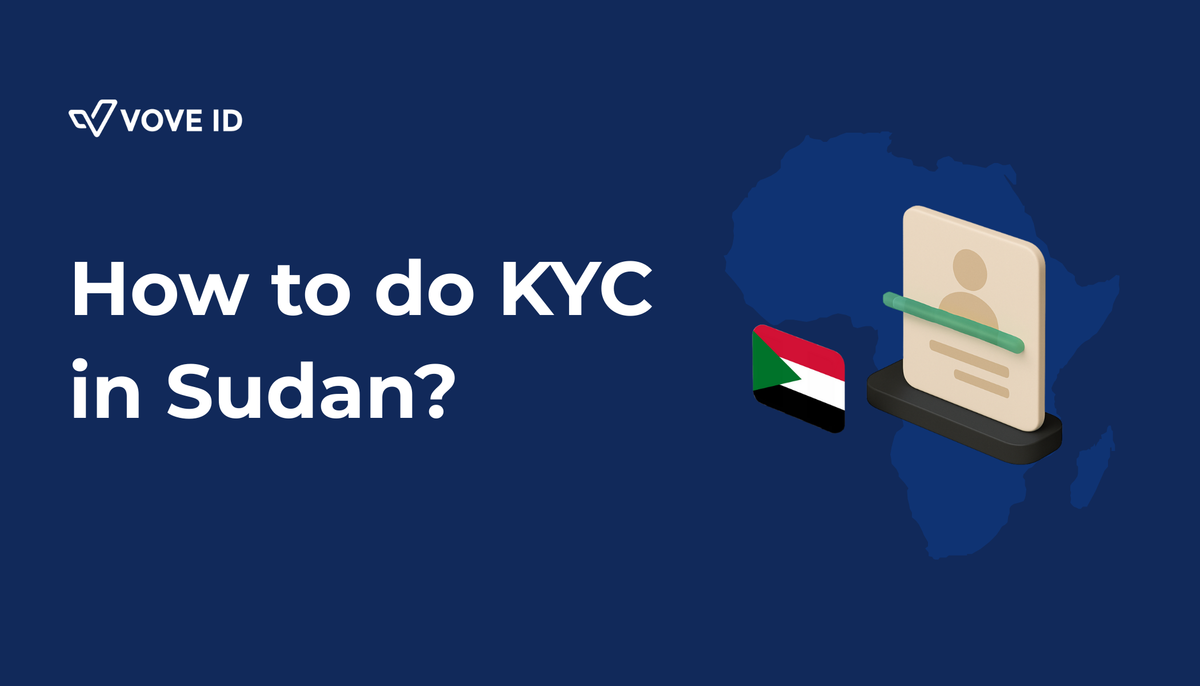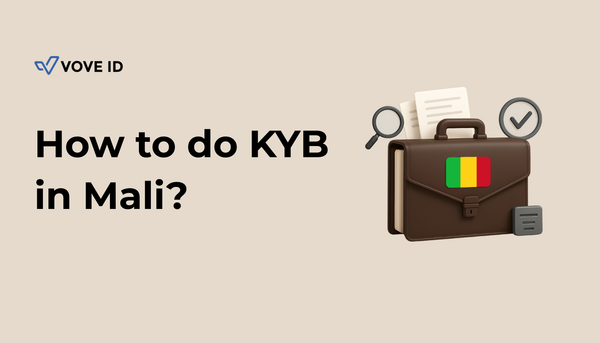KYC Compliance in Sudan: 2025 Guide for Regulated Businesses
Explore how Sudan’s banks and fintechs meet KYC, AML, and eKYC compliance under CBOS and FIU frameworks, with VOVE ID simplifying digital onboarding.

As Sudan’s financial ecosystem continues its gradual digital transformation, Know Your Customer (KYC) compliance is becoming a top priority for banks, fintechs, and remittance providers. The push toward digital identity verification is driven by the Central Bank of Sudan (CBOS) and the Financial Intelligence Unit (FIU), which are strengthening oversight to ensure transparency and prevent illicit financial activities.
That’s where VOVE ID plays a crucial role by helping regulated institutions onboard customers securely, verify identities in seconds, and maintain compliance with evolving regulatory frameworks across Sudan’s financial sector.
Regulatory Framework: The Foundation of KYC in Sudan
The backbone of KYC in Sudan is built on the AML/CTF Act of 2014, supported by directives from the Central Bank of Sudan (CBOS). Together, these frameworks require all financial institutions, money transfer services, and fintech operators to perform Customer Due Diligence (CDD) before establishing any business relationship.
Under CBOS supervision:
- Institutions must identify and verify the true identity of customers using reliable, independent documents.
- Enhanced Due Diligence (EDD) is required for higher-risk customers or complex transactions.
- Companies are expected to maintain detailed customer records for several years and provide them to regulators upon request.
These regulations align with international FATF recommendations, reinforcing Sudan’s commitment to transparency and secure financial inclusion.
The KYC Process in Sudan
The KYC process in Sudan follows global best practices, with additional adaptations for local documentation standards and infrastructure challenges.
1. Customer Identification and Verification
Financial institutions must collect and verify official identity documents such as:
- National ID card
- Passport
- Driver’s license
- Residence permit
Verification can be done manually or through digital verification tools.
Solutions like VOVE ID simplify this process by using AI-based document scanning, OCR, and biometric authentication, ensuring accuracy and reducing onboarding time.
2. Beneficial Ownership and Corporate Verification
For businesses, institutions must identify the beneficial owner: the natural person who owns or controls at least 25% of the company. This step helps prevent the misuse of shell entities and supports KYB (Know Your Business) compliance, which often overlaps with KYC for corporate clients.
3. Risk Profiling and Monitoring
Each customer is assigned a risk category based on factors like geography, transaction volume, and business type. Higher-risk clients undergo enhanced due diligence, including ongoing transaction monitoring and source-of-funds checks.
With VOVE ID, compliance teams can automate this workflow by capturing data, screening against watchlists, and maintaining a secure audit trail from onboarding to monitoring.
Digital ID Landscape in Sudan
Sudan’s digital identity ecosystem is still in its formative stages. The Civil Registry Authority manages national ID issuance, but connectivity and verification infrastructure remain limited, especially in rural areas.
Recent government-led modernization efforts aim to strengthen the National Civil Registry and link identity data with financial services. These initiatives are crucial for expanding financial inclusion, especially as mobile money and fintech adoption rise across the country.
Despite the infrastructural hurdles, Sudan’s regulators and financial institutions are moving steadily toward electronic KYC (eKYC) systems. This evolution reflects a broader trend across Africa by using digital identity verification to bridge gaps between regulation, access, and innovation.
eKYC Adoption: A Step Toward Smarter Compliance
Electronic KYC (eKYC) is emerging as a viable solution to Sudan’s verification challenges. By integrating digital tools, financial institutions can reduce manual errors, prevent fraud, and accelerate customer onboarding.
Key components of eKYC adoption in Sudan include:
- Biometric verification: Facial recognition and liveness detection to confirm genuine user presence.
- Automated document validation: Instant verification of national IDs, passports, and driver’s licenses.
- Sanctions and PEP screening: Checking against global databases for compliance assurance.
- API-based onboarding: Seamless integration into banking apps and fintech platforms.
Through VOVE ID, institutions can deploy all of these capabilities with minimal technical friction, enabling compliant, remote onboarding even in low-connectivity environments.
Challenges in Implementing KYC in Sudan
While Sudan’s regulatory direction is clear, the path to full digital compliance remains complex. Key challenges include:
- Limited infrastructure: Many financial institutions still depend on manual verification due to weak database access and slow connectivity.
- Fragmented supervision: Enforcement of KYC guidelines can vary across regions.
- Data inconsistency: Incomplete or outdated identity records hinder automated verification.
- High onboarding costs: Manual compliance processes increase operational expenses, especially for small fintechs.
- Low ID penetration: Many citizens in rural areas lack formal identification, restricting access to regulated financial services.
In this context, VOVE ID provides a scalable, cost-effective alternative. Its cloud-based verification system operates efficiently in bandwidth-constrained environments, helping institutions meet compliance requirements without sacrificing accessibility.
How VOVE ID Strengthens KYC Compliance in Sudan
VOVE ID is purpose-built for African markets like Sudan, where digital transformation and regulatory compliance must evolve together. The platform empowers compliance teams through:
- Instant Document Verification – AI-powered OCR and forgery detection for IDs, passports, and licenses.
- Biometric Authentication – Facial recognition and liveness checks to verify real users.
- API Integration – Easy connection to apps, CRMs, and onboarding systems.
- Automated Recordkeeping – Secure data storage for audits and reporting.
- Risk-Based Workflows – Dynamic due diligence levels based on customer risk.
By integrating VOVE ID, businesses in Sudan can cut onboarding costs, strengthen fraud defenses, and accelerate growth: all while staying aligned with CBOS and FIU compliance standards.
Over 60% of Sudan’s population remains outside formal banking, making digital KYC essential for financial inclusion.
The Civil Registry Authority is digitizing millions of ID records to improve data accuracy for fintech verification.
Many mobile money providers in Sudan are now using remote KYC onboarding for account activation.
Conclusion: Powering Trust Through Digital Compliance
KYC compliance in Sudan is evolving from a paper-based requirement into a digital standard that defines customer trust and financial access. As Sudan’s fintech and banking sectors continue to modernize, businesses that embrace automation and digital verification will lead the way in secure, inclusive growth.
VOVE ID helps institutions achieve that future by simplifying onboarding, preventing fraud, and ensuring full compliance with CBOS and FIU regulations.
👉 Ready to modernize your KYC process in Sudan?
Start today with VOVE ID, and transform compliance into a competitive advantage.




